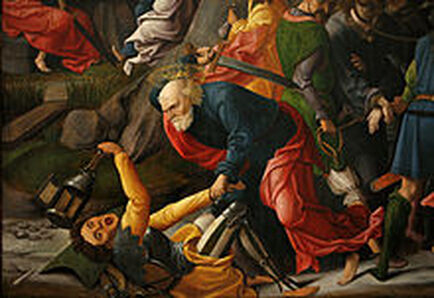The Gospel According to St. John
The King James Bible
|
John 18:1-11
Judas betrays the Messiah 1 When Jesus had spoken these words, he went forth with his disciples over the brook Cedron, where was a garden, into the which he entered, and his disciples. 2 And Judas also, which betrayed him, knew the place: for Jesus ofttimes resorted thither with his disciples. 3 Judas then, having received a band of men and officers from the chief priests and Pharisees, cometh thither with lanterns and torches and weapons. 4 Jesus therefore, knowing all things that should come upon him, went forth, and said unto them, Whom seek ye? 5 They answered him, Jesus of Nazareth. Jesus saith unto them, I am he. And Judas also, which betrayed him, stood with them. 6 As soon then as he had said unto them, I am he, they went backward, and fell to the ground. 7 Then asked he them again, Whom seek ye? And they said, Jesus of Nazareth. 8 Jesus answered, I have told you that I am he: if therefore ye seek me, let these go their way: 9 That the saying might be fulfilled, which he spake, Of them which thou gavest me have I lost none. 10 Then Simon Peter having a sword drew it, and smote the high priest's servant, and cut off his right ear. The servant's name was Malchus. 11 Then said Jesus unto Peter, Put up thy sword into the sheath: the cup which my Father hath given me, shall I not drink it? |
Margin notes:
"When Jesus had spoken these words." (18:1) - "These words" refer to the prayer (John 17:1-26) Jesus just finished in lesson 207. "The brook Cedron." (18:1) - A small stream east of Jerusalem just 6-7 feet wide, sometimes called Brook Kidron. Except for the rainy season, Cedron Brook is usually dry. When pagan idols were removed from the Temple in Jerusalem, they were destroyed and thrown into the brook (2 Kings 23:6; 23:12; 2 Chronicles 29:16; 30:14). Despite its small size, it's mentioned often in the Old Testament (2 Samuel 15:23; 1 Kings 2:37; and 15:13. "A garden." (18:1) - This was Gethsemane Garden, an olive garden located at the foot of the western slope of the Mount of Olives near Cedron Brook, two miles east of Jerusalem. Jesus and His disciples stayed there often when visiting Jerusalem (18:2). "A band of men and officers from the chief priests and Pharisees." (18:3) - The chief priests sent Temple guards and a detachment of Roman soldiers, in case there was trouble, to arrest Jesus. They feared Jesus' followers might put up a fight. It is around midnight. Additional Note: This was not the first time the chief priests and Pharisees sent "officers" to arrest Jesus (John 7:32). "Knowing all things that should come upon him." (18:4) - Jesus knew He would be arrested, slapped, beaten, scourged, and crucified. Yet, to free mankind from sin, He went willingly to the cross. "They went backward, and fell to the ground." (18:6) - Despite their weapons and superior numbers, the arresting party felt the divine power of God, stepped back, and fell to the ground. "Let these go their way." (18:8) - Even though Peter attacked a member of their group with a sword (18:10), the soldiers obeyed the "criminal" they came to arrest and let everyone, including Peter go. Is there any doubt that Jesus could have avoided His own arrest, if He wanted? "Of them which thou gavest me have I lost none." (18:9) - Despite the hardships and persecution, Jesus didn't lose any disciples besides Judas, the son of perdition (John 17:12). "Simon Peter having a sword." (18:10) - Jesus' group had two swords (Luke 22:38). "Malcus." (18:10) - A servant to the high priest, Malcus joined the mob sent to arrest Jesus. Peter cut off his ear, but Jesus miraculously restored it (Luke 22:50-51). |
You can find three additional reports of Jesus' arrest in Matthew 26:47-57 (lesson 56), Mark 14:43-50 (lesson 95) and Luke 22:47-53 (lesson 157).
New Living Translation
John 18:1-11
Jesus Is Betrayed and Arrested
1 After saying these things, Jesus crossed the Kidron Valley with his disciples and entered a grove of olive trees.
2 Judas, the betrayer, knew this place, because Jesus had often gone there with his disciples.
3 The leading priests and Pharisees had given Judas a contingent of Roman soldiers and Temple guards to accompany him. Now with blazing torches, lanterns, and weapons, they arrived at the olive grove.
4 Jesus fully realized all that was going to happen to him, so he stepped forward to meet them. "Who are you looking for?" he asked.
5 "Jesus the Nazarene," they replied.
"I Am he," Jesus said. (Judas, who betrayed him, was standing with them.)
6 As Jesus said "I Am he," they all drew back and fell to the ground!
7 Once more he asked them, "Who are you looking for?"
And again they replied, "Jesus the Nazarene."
8 "I told you that I Am he," Jesus said. "And since I am the one you want, let these others go."
9 He did this to fulfill his own statement: "I did not lose a single one of those you have given me."
10 Then Simon Peter drew a sword and slashed off the right ear of Malchus, the high priest's slave.
11 But Jesus said to Peter, "Put your sword back into its sheath. Shall I not drink from the cup of suffering the Father has given me?"
This second Bible text from the "New Living Translation" (Tyndale House, Publishers, Wheaton, Illinois) is a paraphrase and not an accurate word for word translation of the Bible. However, it is a helpful tool when read with the "King James Version."
Today's question:
1. What does drink from "the cup" mean? (18:11)
Know anyone interested in Free Bible lessons?
1. What does drink from "the cup" mean? (18:11)
Know anyone interested in Free Bible lessons?
Answer: (Do you agree?)
1. Drinking from "the cup" refers to the suffering Jesus will soon undergo at the hands of His tormentors. Jesus needed to suffer a miserable death to wash away humanities sins.
Application thought for the day:
Jesus Christ didn't come to rule mankind but to serve it.
When His followers tried to make Him king, He refused (John 6:15).
When they came to crucify Him, He went willingly.
1. Drinking from "the cup" refers to the suffering Jesus will soon undergo at the hands of His tormentors. Jesus needed to suffer a miserable death to wash away humanities sins.
Application thought for the day:
Jesus Christ didn't come to rule mankind but to serve it.
When His followers tried to make Him king, He refused (John 6:15).
When they came to crucify Him, He went willingly.
Thanks to the writings and commentary of John Wesley and Adam Clarke. Also, "The Layman's Bible Study Notebook" by Irving Jensen published by Harvest House Publishing, Irvine, California; the "Life Change Series" published by NavPress Books, Colorado Springs, Colorado; the "Life Application Study Bible" published by Tyndale House Publishing, Carol Stream, Illinois; the "Quest Study Bible" published by The Zondervan Corporation, Grand Rapids, Michigan; "Robertson's New Testament Word Studies;" "The MacArthur Bible Commentary" by John MacArthur published by Thomas Nelson, Nashville, Tennessee; "Wisdom of the Bible" CD by Topics Entertainment, Inc., Renton, Washington for their inspiring pictures; "My utmost for His Highest" by Oswald Chambers published by Barbour Publishing, Inc., Uhrichsville, Ohio; The "Treasury of Scriptural Knowledge" by Reuben Archer Torrey; "Hope For Each Day" by Billy Graham published by J. Countryman, a division of Thomas Nelson, Inc., Nashville, Tennessee; "Easton's Bible Dictionary" by Matthew George Easton; "Unger's Bible Dictionary" by Merrill F. Unger, published by Moody Press, Chicago, Illinois; "Halley's Bible Handbook" by Henry H. Halley, Zondervan Publishing House, Grand Rapids, Michigan; "The Everyday Bible" published by World Wide Publications, Minneapolis, Minnesota; "The Living New Testament" published by Tyndale house; "The New Living Translation" published by Tyndale House; "The New Testament" translated from the Latin Vulgate, published by Guild Press, New York, New York; BibleGateway.com for all their wonderful links; and of course the "King James Bible." All were critical in putting these lessons together.
© 2024 evolke
© 2024 evolke




